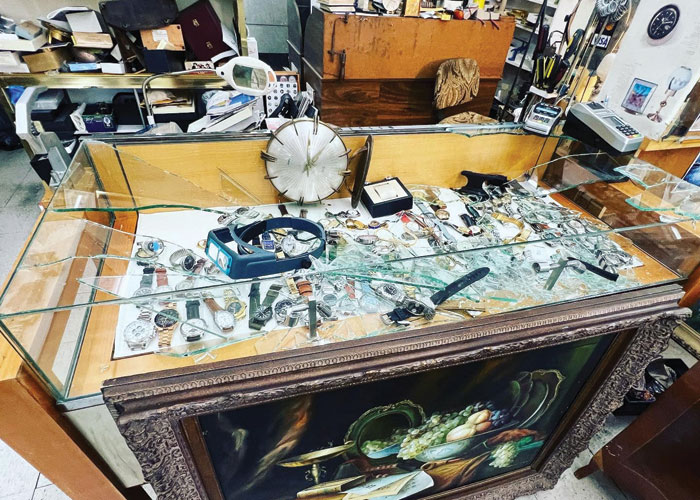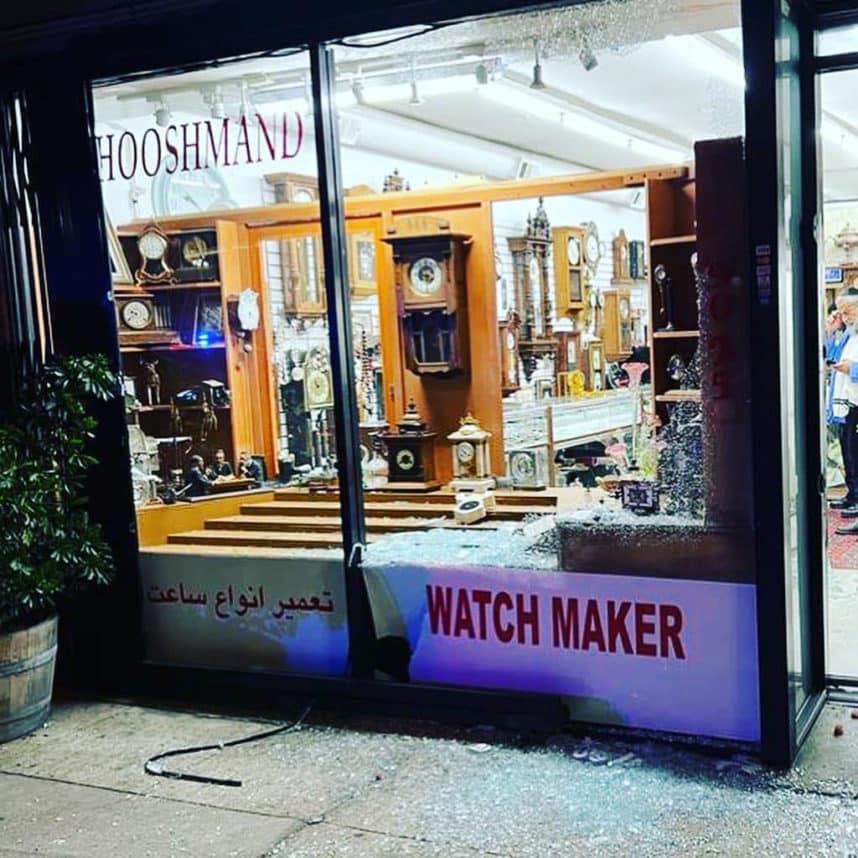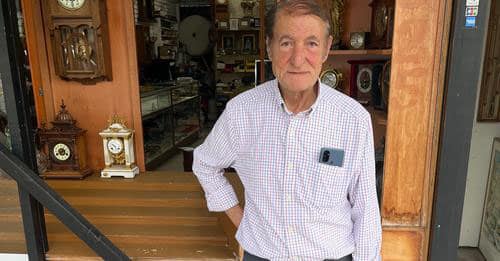 Photo by Sam Yebri
Photo by Sam Yebri Menachem Kashanian, 28, was riding his bicycle to synagogue at 7:30 a.m. on Sunday, July 25 when he saw an older man sitting on the sidewalk, alone and visibly distraught. Kashanian instinctively stepped off of his bicycle and approached the man. That’s when he noticed the broken glass.
Hooshmand Talasazan, a 75-year-old Iranian Jewish small business owner who arrived in the United States as a refugee in 1997, sat on a chair, staring in disbelief at the remains of his life’s work: a watch and antique shop called Hooshmand Antique Watches on Pico Boulevard in West Los Angeles. Several hours earlier, at 4 a.m., two men spray-painted his security camera, broke locks and a metal security gate and ransacked the store. Video footage shows them breaking glass display cases with a sledgehammer. Outside the store, an accomplice waited curbside in an SUV.

“My heart almost stopped,” Talasazan told me about seeing the remains of his store that morning. “I saw how it was all damaged, destroyed and shattered. They took everything they could take.” In a solemn tone, Talasazan estimated that he suffered over $150,000 worth of stolen merchandise.
That probably explains why, when Kashanian found him sitting alone on the sidewalk and staring at the wreckage, Talasazan told him, “Zendegeem raft; zendegeemo bordan” (‘My life is gone; they took my life”). Like Talasazan, Kashanian is also an Iranian American Jew and was able to converse with the shopkeeper in Persian.
Talasazan has been in the watch and antique business for 40 years—first in Tehran and then in Los Angeles. It’s all he knows. As his shaky voice described some of his lost items, it was almost as if he was in fond remembrance of old friends. Some stolen objects, like antique locks that Talasazan had brought with him from Iran, were collectors’ items that also held indescribable sentimental value for the aging shopkeeper.
“The locks [from Iran] were so special,” he said. “They were truly collectors’ items and so very beautiful.” He valued the stolen locks at $70,000-$80,000. “They also took unique hand watches and pocket watches; some of them were 1940s/1950s-era watches,” he noted with sadness.
Talasazan is still waiting for more information about theft coverage from his insurance company; he’s deeply worried about not being able to recoup his losses.
When Kashanian found Talasazan sitting on the sidewalk outside his burglarized store, the young man pulled out his phone and began filming. “My first reaction was that I needed to film what’s happening,” he told me. “Everything was raw and left exactly as it was from the robbery,” he said. He posted the short video to social media, including Facebook and Instagram; it instantly went viral.
It’s not easy to watch Kashanian’s video, especially when he turns his camera to Talasazan and captures a devastating moment of heartbreak from a man staring at the ruins of his livelihood and his passion. In that fleeting moment, Talasazan breaks down and quietly sobs.
Kashanian had passed the store on his way to morning prayers and a class at Kehillat Bnai Torah, a synagogue located next to Talasazan’s store. With the help of Iranian American Jewish community members Yehuda Masjedi and Kiya Eshaghian, the young men brought a broom and a waste basket from an upstairs room and a large trash can from the neighboring synagogue and began sweeping the floors. Soon after, other worshippers from Kehillat Bnai Torah began to help as well. “We wanted to remove the stain of what had happened to him [Talasazan],” said Kashanian.
And then, Kashanian took to his phone once again, this time, to create a GoFundMe campaign. Within hours, he had collected over $15,000 to help Talasazan.
There was only one problem: “At first, he was embarrassed to accept any funds because he’s an extremely proud man,” Talasazan’s daughter, Niloufar Mobassery, told me about her father. “He was absolutely devastated and broken.”
Talasazan opened his store in 1998, one year after arriving to the U.S. as a protected refugee with his wife and two daughters (a third daughter arrived later from Iran). With the help of HIAS (formerly the Hebrew Immigrant Aid Society), the family was re-settled in Los Angeles. Talasazan’s store was first located on Beverly Boulevard but then moved to Pico Boulevard.

“He left Iran more for us than for himself, so that we could have more opportunities,” said Mobassery, who also lives in Los Angeles. According to Mobassery, her father and mother have always lived modestly in the U.S., and for her father, the store is so much more than a place of work. “He’s a gentle and generous man,” she said. “This is all he knows and all he loves. The watches are his babies. He literally takes care of them; they’re very important to him. He has a tremendous love for what he does.”
Talasazan’s store did not have an alarm; shortly after the break-in, the owner of the building from whom he rents the shop contacted Talasazan’s eldest daughter, Ghazaleh Talasazan, with the bad news.
But this isn’t the first time Hooshmand Talasazan has been the victim of robbery; in fact, it’s the fourth time in 25 years. The last incident occurred in 2020, when his store was targeted during the civil unrest and mass looting that tore through Los Angeles after video footage of George Floyd dying while in police custody in Minneapolis went viral.
I asked Mobassery, his daughter, how Talasazan recouped after that particular loss. “He didn’t,” she said. “During the 2020 robbery, he didn’t even have insurance.” But today, Talasazan is deeply moved and grateful to the local community for its incredible support, including GoFundMe donors as well as kind individuals who have sponsored security cameras and new glass for his storefront, and a local attorney who is offering him pro-bono services. Currently, the GoFundMe campaign has raised over $60,000, though much of it may be reimbursed to donors depending on the scope of Talasazan’s insurance coverage.
“I’m so grateful to everyone who has helped me, to those who’ve stopped by to cheer me up,” he said. Some of those visitors have included children. Not surprisingly, with its multitude of charming watches small and large, the store was a favorite among local kids.
“Like all the rest of us, he worked very hard and he really had high hopes,” said Mobassery, “but I don’t think his American dream ever came true. Not for him, personally. For his children, but not for him. His dream was to have a successful business, to own a house, and live a financially stable life.”
Sadly, Talasazan’s work life in America has been marred by theft. “From the day I came from Iran to LA, I’ve been robbed,” he said. “First by the manager of my first store on Beverly Drive, then when the store was on the other side of Pico, when a robber put a gun to my head in 2010, again in 2020, when looters actually ripped off the door and now.”
According to Mobassery, her father wants to stay at the current Pico location, though his family is pleading with him to move the store elsewhere. “We’re trying to change his mind. I don’t know how many more safeguards we can put in place,” she said. Despite his pain, Talasazan wants to stay in the heart of the city’s Iranian and Jewish community, and he’s deeply concerned about whether he’ll be able to afford rent prices if he moves the store away from Pico Boulevard.
Talasazan’s story is a somber reminder that sometimes a refugee or immigrant’s redemption in America can still be marred by lack of safety and security.
Talasazan’s story is a somber reminder that sometimes a refugee or immigrant’s redemption in America can still be marred by lack of safety and security. Undoubtedly, Talasazan suffered indescribable loss when he escaped Iran at the age of 50 and began anew in this country, but the loss he’s suffered in the United States has left its own unique trauma.
And in the end, the trauma of repeatedly lost livelihood — and the loss of trust in the American dream — finally seems to have shattered Talasazan. His daughter, Niloufar, captured such heartbreak when she asked me, “Wasn’t escaping Iran a challenge on its own? How much of a financial and emotional loss can one person take?”
For more information on the GoFundMe for Hooshmand Talasazan, visit https://www.gofundme.com/f/hooshmand-the-watchmaker-recover-form
Tabby Refael is an award-winning weekly columnist and an LA-based writer, speaker and civic action activist. Follow her on Twitter @TabbyRefael























 More news and opinions than at a Shabbat dinner, right in your inbox.
More news and opinions than at a Shabbat dinner, right in your inbox.